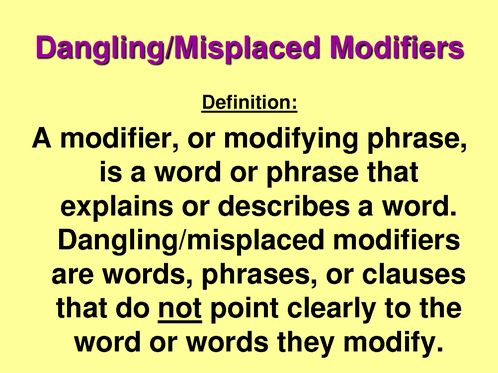02/2015 - The Grammar-Us Blog - Grammar-Us
Main menu:
Pardon Me, Your Participle is Dangling!
 Before you can confirm that your participle is indeed dangling, you first need to understand exactly what a participle is! In simple terms, a participle is an adjective (modifier) in verb form. For example: running man (the word “running” is the participle, describing the man). Participles typically end in “ing” (present participle), “ed” or “en” (past participles).
Before you can confirm that your participle is indeed dangling, you first need to understand exactly what a participle is! In simple terms, a participle is an adjective (modifier) in verb form. For example: running man (the word “running” is the participle, describing the man). Participles typically end in “ing” (present participle), “ed” or “en” (past participles).
Very often, the participle is one of several words forming a participle (sometimes called “participial”) phrase. For example: Traveling to Venice, I enjoyed the scenery from the train window. The phrase “traveling to Venice” is the participle phrase, and it modifies, or describes, the subject of the sentence (“I”). These multi-
As you know if you have been reading my blog on a regular basis, I constantly preach clarity and conciseness as keys to good writing. Dangling participles, aside from being grammatically incorrect, definitely do not lend themselves to these ideals! Instead of helping to paint a picture for the reader by giving him further information, they actually make the reader work harder. You don’t want to waste your reader’s time by making him struggle to figure out what you are trying to say!
Here are five examples of dangling participle phrases and how to fix them:
1. Moving to Texas, the hot weather was a real shock to me. Because it is located so close to the subject of the sentence (“weather”), it appears that the participle phrase, “Moving to Texas” indicates that the weather is doing the moving. However, it is far more probable that the writer intended to inform the reader that he/she was moving to Texas, not the hot weather!
To make this sentence easier to understand, a little rewording will prove helpful: Moving to Texas, I was shocked by the hot weather. There, you see? It is now much more clear who was actually doing the moving!
2. Focusing on improving my math grades, my English homework did not get finished. Although homework (the subject of this sentence) may be assigned as a tool to help a student improve his/her grades, it is the student who must do the focusing.
To fix this sentence, it could be reworded as follows: Focusing on improving my math grades, I did not finish my English homework. By making “I” the subject of the sentence, instead of "homework,” I have clarified for the reader who is doing the focusing.
3. Wanting to see the Eiffel Tower, the bus I chose took me directly to it. It is highly unlikely that the bus (the subject of this sentence) had any independent desire of its own to see the Eiffel Tower!
To make it clear to the reader that it is the tourist who wanted to see the Eiffel Tower, it is necessary to make “I” the subject of the sentence, rather than “bus.” This is the reworded version: Wanting to see the Eiffel Tower, I chose a bus that took me directly to it.
4. Jumping over the fence, Mary’s shoe fell off. Mary’s shoe indeed may have fallen off, but it did not, of its own accord, jump over the fence to do so.
Correct: Jumping over the fence, Mary lost her shoe when it fell off. Now, it is clear that Mary was the one doing the jumping.
5. Fearing a robbery, my money was tucked inside my bra instead of my wallet. Money is an inanimate object and cannot fear anything. However, I can certainly be afraid of being robbed!
Therefore, to fix this sentence, I would reword it as follows: Fearing a robbery, I tucked my money inside my bra instead of inside my wallet. As I hope you can see from the above examples, the key to roping in those pesky dangling participles is to tie them, as closely as possible, to what they are intended to modify, and what they are meant to modify is almost always the subject of the sentence. Location, location, location is the key. If the subject of your sentence is not what you intend to modify, then change the subject. Your readers will thank you for it, because they won’t have to tax their brains to visualize the picture you are attempting to paint for them.
As I hope you can see from the above examples, the key to roping in those pesky dangling participles is to tie them, as closely as possible, to what they are intended to modify, and what they are meant to modify is almost always the subject of the sentence. Location, location, location is the key. If the subject of your sentence is not what you intend to modify, then change the subject. Your readers will thank you for it, because they won’t have to tax their brains to visualize the picture you are attempting to paint for them.
- FRESH WRITING
- TWELVE ERRORS THAT MAKE A GRAMMARIAN GNASH HER TEETH
- THE WHYS AND HOWS OF WRITING AN EFFECTIVE CONSUMER LETTER
- FILLER WORDS: THE "JUNK FOOD" OF COMMUNICATIONS
- Pardon Me, Your Participle is Dangling!
- MAKE BETTER GRAMMAR A NEW YEAR’S RESOLUTION
- The Value Of Personal Letters
- How To Make Your Writing Flow
- How (And Why) To Tighten Up Your Writing
- Why Grammar Matters
- Time For Another Grammar Quiz!
- Editing: The "Make Or Break" Skill
- Proofreading: It Matters More Than You Think!
- Please Don't Ruin A Perfectly Good Tense!
- A Brave New Word
- Homophones: The Sequel
- Coulda, Shoulda, Woulda And Other Incorrectly Written Words
- More Homophones
- Time For Another Grammar Goof Quiz
- A Different Kind Of Colonoscopy (And Semi-Colonoscopy)
- Comparatives & Superlatives: The Good, The Bad, And The Ugly
- Either/Or, Neither/Nor: Decisions, Decisions!
- Let's Agree To Agree
- Avoiding Apostrophe Apocolypse
- Let's Pause To Honor The Comma!
- Three Speech Patterns That Can Compromise Professionalism
- A Hit Parade of Grammar Misses
- Negative Nancy Has Hijacked My Blog!
- Who Dat?
- Avoiding the Ill Effects of Misusing "Affect"
- How To Perfectly Use Six Irregular Verbs
- Random Ramblings
- Me, Myself and I: The Narcissist's Nightmare
- Confounding Compounds
- "All The World's A Stage...": Know Your Audience
- From The Department Of Redundancy Department: The Whole Entire Scoop On "Whole" And "Entire"
- Grammatically Challenged? There, Their, They're. It'll Be OK!
- "Its": It's a Special Exception
- We're Up And Running!